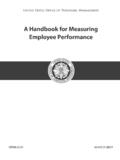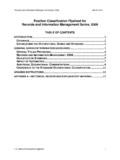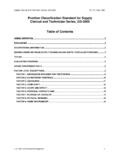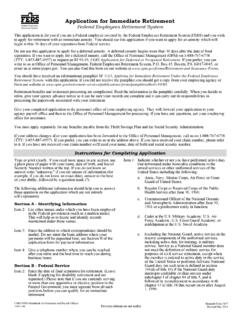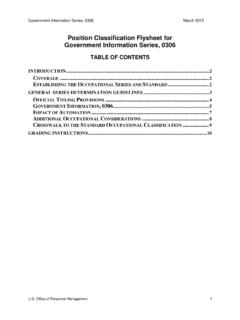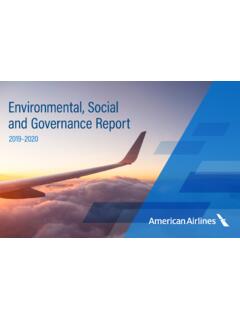Transcription of Position Classification Standard for Environmental ...
1 Environmental protection Specialist series , GS-0028 TS-133 March 1995 Position Classification Standard FOR Environmental protection SPECIALIST series , GS-0028 Table of Contents series OCCUPATIONAL RELATED 5 DISTINGUISHING BETWEEN Environmental protection SPECIALIST AND Environmental SCIENTIST DISTINGUISHING BETWEEN Environmental protection SPECIALIST AND Environmental protection ASSISTANT EVALUATING GRADE CONVERSION FACTOR LEVEL FACTOR 1, KNOWLEDGE REQUIRED BY THE FACTOR 2, SUPERVISORY FACTOR 3, FACTOR 4, FACTOR 5, SCOPE AND FACTOR 6, PERSONAL FACTOR 7, PURPOSE OF FACTOR 8, PHYSICAL FACTOR 9, WORK Office of Personnel Management 1 Environmental protection Specialist series , GS-0028 TS-133 March 1995 series DEFINITION This series includes positions that involve advising on, managing, supervising, or performing administrative or program work relating to Environmental protection programs ( , programs to protect or improve Environmental quality, control pollution, remedy Environmental damage, or ensure compliance with Environmental laws and regulations).
2 These positions require specialized knowledge of the principles and methods of administering Environmental protection programs and the laws and regulations related to Environmental protection activities. EXCLUSIONS 1. Classify positions that require professional knowledge and competence in the broad, multi- disciplinary field of Environmental science, which encompasses chemistry, biology, toxicology, health, physics, safety, and related areas, in the General Physical Science series , GS-1301. 2. Classify positions that primarily require professional knowledge and competence in one or more specialized disciplines of Environmental science in the appropriate professional series , , Ecology series , GS-0408; Chemistry series , GS-1360. 3. Classify positions that involve professional engineering work concerned with eliminating or controlling Environmental hazards or conditions in the appropriate engineering series , , Civil Engineering series , GS-0810; Environmental Engineering series , GS-0819.
3 4. Classify positions that involve professional legal work concerned with enforcing Environmental laws and regulations in the General Attorney series , GS-0905. 5. Classify positions that involve preventing or controlling environmentally related diseases and health problems/hazards (when the emphasis is on the health and welfare aspects of the work, , sanitation or hygiene) or assuring compliance with health and safety laws and regulations in the appropriate Environmental health series , , Safety and Occupational Health Management series , GS-0018; Sanitarian series , GS-0688; Industrial Hygiene series , GS-0690. 6. Classify positions that require professional knowledge and competence in the conservation or management of soil, water, plant, animal, or related natural resources for particular purposes or uses in the appropriate scientific/conservation series , , Rangeland Management series , GS-0454; Wildlife Biology series , GS-0486.
4 7. Classify positions that involve professional work concerned with identifying, evaluating, and protecting archeological, historical, and cultural resources (artifacts, structures, sites, etc.,) in the appropriate professional series , , Archeology series , GS-0193; Architecture series , GS-0808. Office of Personnel Management 2 Environmental protection Specialist series , GS-0028 TS-133 March 1995 8. Classify positions that primarily require specialized knowledge related to the administration of programs to preserve and protect natural or cultural resources in the Miscellaneous Administration and Program series , GS-0301. 9. Classify positions involving program management or direction that do not require specialized knowledge of Environmental programs in the Program Management series , GS-0340. 10. Classify positions concerned with analyzing and evaluating the effectiveness and efficiency of program operations and management that do not require specialized knowledge of Environmental programs in the Management and Program Analysis series , GS-0343.
5 11. Classify positions that primarily require specialized knowledge of financial or business and trade practices and processes in the appropriate administrative or management series , , Contracting series , GS-1102; Property Disposal series , GS-1104; Realty series , GS-1170. 12. Classify positions involving compliance work that do not require specialized knowledge of Environmental programs in an appropriate compliance series , , General Inspection, Investigation, and Compliance series , GS-1801; General Investigating series , GS-1810. 13. Classify positions concerned with public information and involvement work that do not require in-depth knowledge of Environmental protection programs and processes in the Public Affairs series , GS-1035. 14. Classify positions that primarily involve performing support work requiring a practical knowledge of program requirements and procedures and/or basic Environmental concepts and techniques in the appropriate technical series , , Environmental protection Assistant series , GS-029; Physical Science Technician series , GS-1311.
6 15. Classify positions that primarily involve hazardous materials handling in an appropriate Federal Wage System occupation. OCCUPATIONAL INFORMATION The Congress has enacted a national charter for the protection of the environment. It establishes policy, sets goals, and provides means for carrying out the policy. In addition, Congress has passed numerous other statutes and amendments to address requirements for Environmental protection and improvement. All Federal agencies are required to comply with Federal, State, local, and host nation Environmental laws and regulations, and relevant Executive Orders. To achieve and maintain compliance, agencies must integrate Environmental considerations into their decision-making processes, prepare detailed Environmental documentation regarding proposed actions, maintain ongoing programs to protect and restore Environmental resources, fulfill numerous Office of Personnel Management 3 Environmental protection Specialist series , GS-0028 TS-133 March 1995 Environmental reporting requirements, etc.
7 Regulatory agencies, principal among which is the Environmental protection Agency, are responsible for rulemaking, monitoring, compliance, and enforcement activities affecting both public and private organizations and for managing and overseeing programs conducted by States and other entities through program delegations (contracts, grants, cooperative agreements, etc.). Environmental protection programs deal with such areas as air and water quality, hazardous waste and materials management, underground storage tanks containing regulated substances (petroleum products, chemicals, and wastes), oil and hazardous substance spills planning, nonhazardous waste management, waste minimization and recycling, and site restoration and remediation. Many programs focus on specific pollutants ( , noise, radon, asbestos, pesticides, medical waste, acid rain) or on protecting a specific medium (land, air, water, wetlands).
8 As it has become recognized that program areas are not always discrete ( , that pollutants pass from air to water, from land to groundwater and back, freely), the focus has begun to shift to more integrated approaches. Consequently, many Environmental protection programs are adopting strategies that deal with the environment in a more coordinated way, , addressing overall Environmental quality objectives, comparing Environmental risks across programs, considering total pollutant loads and exposures, preventing pollution instead of controlling or transferring it to other parts of the environment, recognizing the worldwide and long-range character of many Environmental problems, and reflecting Environmental priorities in policies for other sectors such as energy, transportation, and agriculture. Environmental protection specialists play a central role in planning and administering Environmental programs.
9 Generally, they perform a variety of functions related to one or more of the following areas: Rulemaking and regulation, which involves developing, reviewing, and implementing legislative proposals, regulations, standards, policies, and operating guidance. Compliance and enforcement, which involves evaluating and securing compliance with Environmental laws and programs through permitting, self-assessments, audits, inspections, investigations, and enforcement and corrective action activities. Environmental considerations and documentation, which involves (1) reviewing proposed actions (construction, leasing, land transactions, mission activities, etc.) and ensuring that Environmental effects are considered in planning and decision-making, that these considerations are documented, and that provision is made for public involvement; (2) complying with Environmental reporting requirements; and/or (3) analyzing and managing Environmental information or information systems.
10 Office of Personnel Management 4 Environmental protection Specialist series , GS-0028 TS-133 March 1995 Program administration and oversight, which involves (1) managing, administering, and coordinating programs or projects to achieve and maintain Environmental compliance of ongoing operations or remediate past Environmental violations or compliance problems; or (2) administering, evaluating, and overseeing Environmental programs and/or activities funded by a program of grants, cooperative agreements, or other similar arrangements. RELATED POSITIONS Because Environmental protection specialist work usually involves circumstances that demand multiple, coordinated responses, it frequently overlaps with work performed by persons in related fields. Environmental protection specialists often use data and information collected and developed by scientists ( , biologists, chemists, hydrologists) and engineers.
